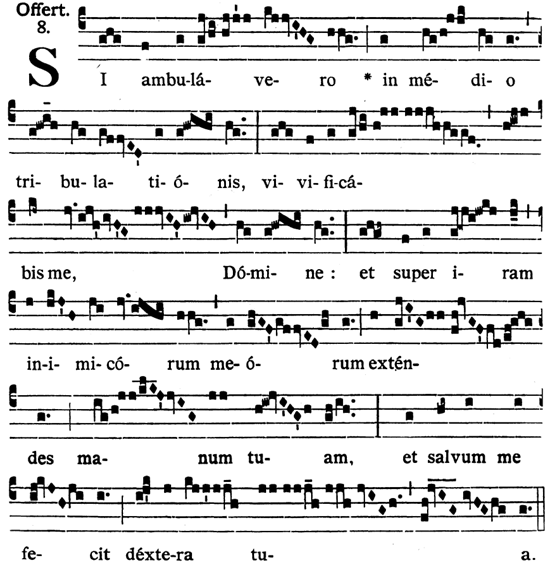Tu Mandasti and Si Ambulavero
-
-
Thanks! I definately agree with you on the Tu Mandasti. It's particularly close to my heart. Just finished choir practice on it!
-
Our schola's favorite (Tu Mandasti) as well. That wonderful circular motion around 'fa'! We sing this section with the organum drone (3 voiced) la-fa-la.
-
Thanks for this thread--it gives me a chance to raise a question I've wondered about for a long time.
Look at the English adaptation of Si Ambulavero. It's set to the mode 2 psalm tone, while the chant from the Graduale uses mode 8. Any ideas on the rationale for changing the mode? The Fr. Rossini psalm tone propers also often change the mode. To my mind, the psalm tone settings of the propers are an expedient to allow beginning or time-taxed scholas to sing the proper texts. I also think that there is some value buried or hidden in the tradition that chose a particular mode for a particular text and/or Mass. In other words, aren't the modalities used for particular propers of some value? The commentaries of Dom Johner and others would seem to indicate that they are.
So does anyone here have any insight on why the psalm tone settings so often change the mode of the chant being set? I can't see in the example given for Si Ambulavero that the psalm tone for mode 2 is easier than that for mode 8. If I were setting propers to psalm tones, it would never occur to me to use another mode other than the one of the chant from the Graduale. -
The Anglican Use uses a formula with an exclusive focus on the text. The Rossini is a mystery. But here is a source that retains the mode.
-
"Si ambulavero" illustrates perfectly the idea that a melody can be composed with the following in mind:
- intimacy between melodic contour and textual meaning
- lack of gratuitous ostentation or sentimentality
- chastity of tone
- reverence for the text.
Evidently such considerations must strike some sacropop composers as bizarre, countercultural, and insufficiently "marketable." -
Because it is such a pretty picture:

Welcome to the MusicaSacra Forum!
To participate in the discussions on Catholic church music, sign in or register as a forum member, The forum is a project of the Church Music Association of America.
Categories
- All Discussions21,280
- General Music Discussion8,297
- Job Openings216
- Management of Music Programs852
- Choral Matters534
- Church Documents and Rubrics528
- CMAA Notes304
- Events730
- For Newcomers: Read First26
- Sacred Polyphony550
- Hymnody875
- Gregorian Chant: General2,710
- ↳ Graduale Romanum and Liber Usualis370
- ↳ Graduale Simplex60
- ↳ Semiology63
- Vernacular Plainsong697
- Anglican Use and Anglican Chant68
- Organ, Other Instruments and Repertoire438
- New Composition/Works in Progress1,302
- Recordings234
- Music for Hispanic Ministry162
- Music Education: Children213
- Music Education: General222
- News Items245
- Positions Wanted3
- General Discussion: Catholicism740
- Amusements178
- General Discussion1,037
- Opinions119

